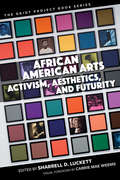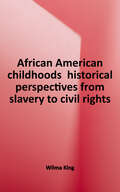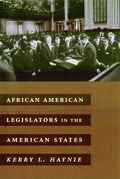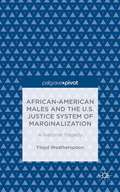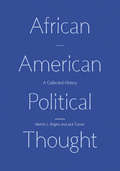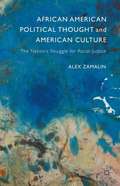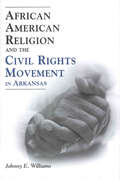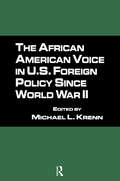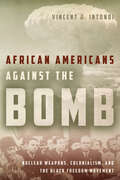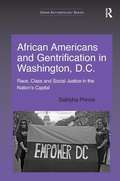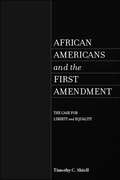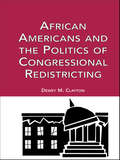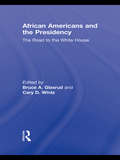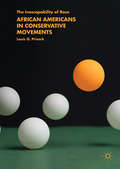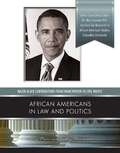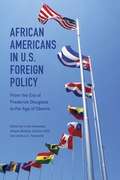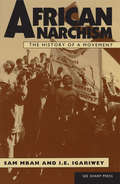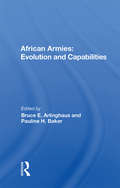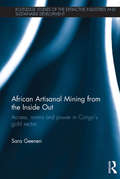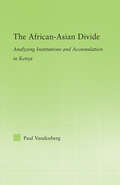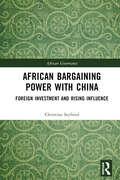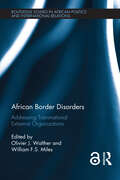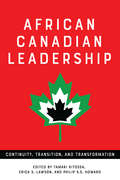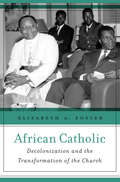- Table View
- List View
African American Arts: Activism, Aesthetics, and Futurity (The Griot Project Book Series)
by Sharrell D. Luckett Carmen Gillespie Rikki Byrd Amber Lauren Johnson Doria E. Charlson Florencia V. Cornet Daniel McNeil Lucy Caplan Genevieve Hyacinthe Sammantha McCalla Nettrice R. Gaskins Abby Dobson J. Michael Kinsey Shondrika Moss-Bouldin Julie B. Johnson Jasmine Eileen Coles Tawnya Pettiford-Wates Rickerby HindsSignaling such recent activist and aesthetic concepts in the work of Kara Walker, Childish Gambino, BLM, Janelle Monáe, and Kendrick Lamar, and marking the exit of the Obama Administration and the opening of the National Museum of African American History and Culture, this anthology explores the role of African American arts in shaping the future, and further informing new directions we might take in honoring and protecting the success of African Americans in the U.S. The essays in African American Arts: Activism, Aesthetics, and Futurity engage readers in critical conversations by activists, scholars, and artists reflecting on national and transnational legacies of African American activism as an element of artistic practice, particularly as they concern artistic expression and race relations, and the intersections of creative processes with economic, sociological, and psychological inequalities. Scholars from the fields of communication, theater, queer studies, media studies, performance studies, dance, visual arts, and fashion design, to name a few, collectively ask: What are the connections between African American arts, the work of social justice, and creative processes? If we conceive the arts as critical to the legacy of Black activism in the United States, how can we use that construct to inform our understanding of the complicated intersections of African American activism and aesthetics? How might we as scholars and creative thinkers further employ the arts to envision and shape a verdant society? Contributors: Carrie Mae Weems, Carmen Gillespie, Rikki Byrd, Amber Lauren Johnson, Doria E. Charlson, Florencia V. Cornet, Daniel McNeil, Lucy Caplan, Genevieve Hyacinthe, Sammantha McCalla, Nettrice R. Gaskins, Abby Dobson, J. Michael Kinsey, Shondrika Moss-Bouldin, Julie B. Johnson, Sharrell D. Luckett, Jasmine Eileen Coles, Tawnya Pettiford-Wates, Rickerby Hinds. Published by Bucknell University Press. Distributed worldwide by Rutgers University Press.
African American Childhoods: Historical Perspectives from Slavery to Civil Rights
by Wilma KingThis text seeks to fill a vacuum in the study of African American children. Recovering the voices or experiences of these children, we observe nuances in their lives based on their legal status, class standing, and social development.
African American Legislators in the American States (Power, Conflict, and Democracy: American Politics Into the 21st Century)
by Kerry HaynieHas black inclusion in the political process changed political institutions and led to more black influence in the governmental process? How do African American legislators balance racial interests with broader issues of government? And how is their effectiveness subjectively perceived and objectively evaluated?In one of the first book-length studies to analyze the behavior of African American state legislators in multiple legislative sessions across five states, Kerry Haynie has compiled a wealth of valuable data that reveals the dynamics and effectiveness of black participation in the legislative process. Owing to the increasing role of state government in administering what he defines as key "black issues"— education, healthcare, poverty/social welfare, civil rights, and children's issues—Haynie focuses on bills introduced in these categories in Arkansas, Illinois, Maryland, New Jersey, and North Carolina.The book reveals how responsive political institutions have been to the nation's largest minority group. It explores the question of how legislators deal with the "duality dilemma"—which requires them to be both responsible legislators and race representatives—and whether agendas should be "deracialized" in order to appeal to a broader constituency. Along with numerous statistical charts illustrating everything from representation on house standing committees to a ranking of the fifteen legislative sessions by quartiles of African American political incorporation, a useful and revealing portrait emerges—one that will fuel debate and inform future discussions of the role of African Americans in the political process.
African-American Males and the U.S. Justice System of Marginalization: A National Tragedy
by Floyd WeatherspoonThis book provides an overview of the economic and social status of African-American males in America which continues to deteriorate at an alarming rate.
African American Perspectives on Political Science
by Rich Wilbur Hamilton CharlesRace matters in both national and international politics. Starting from this perspective, African American Perspectives on Political Science presents original essays from leading African American political scientists. Collectively, they evaluate the discipline, its subfields, the quality of race-related research, and omissions in the literature. They argue that because Americans do not fully understand the many-faceted issues of race in politics in their own country, they find it difficult to comprehend ethnic and racial disputes in other countries as well. In addition, partly because there are so few African Americans in the field, political science faces a danger of unconscious insularity in methodology and outlook. Contributors argue that the discipline needs multiple perspectives to prevent it from developing blind spots. Taken as a whole, these essays argue with great urgency that African American political scientists have a unique opportunity and a special responsibility to rethink the canon, the norms, and the directions of the discipline.
African American Political Thought: A Collected History
by Jack Turner Melvin L. RogersAfrican American Political Thought offers an unprecedented philosophical history of thinkers from the African American community and African diaspora who have addressed the central issues of political life: democracy, race, violence, liberation, solidarity, and mass political action. Melvin L. Rogers and Jack Turner have brought together leading scholars to reflect on individual intellectuals from the past four centuries, developing their list with an expansive approach to political expression. The collected essays consider such figures as Martin Delany, Ida B. Wells, W. E. B. Du Bois, James Baldwin, Toni Morrison, and Audre Lorde, whose works are addressed by scholars such as Farah Jasmin Griffin, Robert Gooding-Williams, Michael Dawson, Nick Bromell, Neil Roberts, and Lawrie Balfour. While African American political thought is inextricable from the historical movement of American political thought, this volume stresses the individuality of Black thinkers, the transnational and diasporic consciousness, and how individual speakers and writers draw on various traditions simultaneously to broaden our conception of African American political ideas. This landmark volume gives us the opportunity to tap into the myriad and nuanced political theories central to Black life. In doing so, African American Political Thought: A Collected History transforms how we understand the past and future of political thinking in the West.
African American Political Thought and American Culture: The Nation's Struggle For Racial Justice
by Alex ZamalinThis book demonstrates how certain African American writers radically re-envisioned core American ideals in order to make them serviceable for racial justice. Each writer's unprecedented reconstruction of key American values has the potential to energize American citizenship today.
African American Religion and the Civil Rights Movement in Arkansas (Margaret Walker Alexander Series in African American Studies)
by Johnny E. WilliamsWhat role did religion play in sparking the call for civil rights? Was the African American church a motivating force or a calming eddy? The conventional view among scholars of the period is that religion as a source for social activism was marginal, conservative, or pacifying. Not so, argues Johnny E. Williams. Focusing on the state of Arkansas as typical in the role of ecclesiastical activism, his book argues that black religion from the period of slavery through the era of segregation provided theological resources that motivated and sustained preachers and parishioners battling racial oppression. Drawing on interviews, speeches, case studies, literature, sociological surveys, and other sources, Williams persuasively defines the most ardent of civil rights activists in the state as products of church culture. Both religious beliefs and the African American church itself were essential in motivating blacks to act individually and collectively to confront their oppressors in Arkansas and throughout the South. Williams explains how the ideology of the black church roused disparate individuals into a community and how the church established a base for many diverse participants in the civil rights movement. He shows how church life and ecumenical education helped to sustain the protest of people with few resources and little permanent power. Williams argues that the church helped galvanize political action by bringing people together and creating social bonds even when societal conditions made action difficult and often dangerous. The church supplied its members with meanings, beliefs, relationships, and practices that served as resources to create a religious protest message of hope.
The African American Voice in U.S. Foreign Policy Since World War II
by Michael L. KrennFollowing World War II, America was witness to two great struggles. The first was onthe international front and involved the fight for freedom around the globe, as millionsof people in Asia and Africa rose up to throw off their European colonial masters. Inthe decades following 1945 dozens of new nations joined the ranks of independentcountries. Following the Civil War, the African-American voice in U.S. foreign affairscontinued to grow. In the late nineteenth century, a few African-Americans — such asFrederick Douglass — even served as U.S. diplomats to the "black republics" of Liberiaand Haiti. When America began its overseas thrust during the 1890s, African-Americanopinion was divided.
African Americans Against the Bomb: Nuclear Weapons, Colonialism, and the Black Freedom Movement
by Vincent J. IntondiWell before Rev. Dr. Martin Luther King, Jr. spoke out against nuclear weapons, African Americans were protesting the Bomb. Historians have generally ignored African Americans when studying the anti-nuclear movement, yet they were some of the first citizens to protest Truman's decision to drop atomic bombs in Hiroshima and Nagasaki in 1945. Now for the first time, African Americans Against the Bomb tells the compelling story of those black activists who fought for nuclear disarmament by connecting the nuclear issue with the fight for racial equality. Intondi shows that from early on, blacks in America saw the use of atomic bombs as a racial issue, asking why such enormous resources were being spent building nuclear arms instead of being used to improve impoverished communities. Black activists' fears that race played a role in the decision to deploy atomic bombs only increased when the U.S. threatened to use nuclear weapons in Korea in the 1950s and Vietnam a decade later. For black leftists in Popular Front groups, the nuclear issue was connected to colonialism: the U.S. obtained uranium from the Belgian controlled Congo and the French tested their nuclear weapons in the Sahara. By expanding traditional research in the history of the nuclear disarmament movement to look at black liberals, clergy, artists, musicians, and civil rights leaders, Intondi reveals the links between the black freedom movement in America and issues of global peace. From Langston Hughes through Lorraine Hansberry to President Obama, African Americans Against the Bomb offers an eye-opening account of the continuous involvement of African Americans who recognized that the rise of nuclear weapons was a threat to the civil rights of all people.
African Americans and Gentrification in Washington, D.C.
by Sabiyha PrinceUsing qualitative data, including extensive interview material and ethnographic research, to explore the experiences and ideas of African Americans as they confront and construct gentrification, this book contextualizes black Washingtonians' perspectives on belonging and attachment during a marked period of urban restructuring and demographic change in the nation's capital.
African Americans and the First Amendment: The Case for Liberty and Equality (SUNY series in African American Studies)
by Timothy C. Shiell2020 CHOICE Outstanding Academic TitleAfrican Americans and the First Amendment is the first book to explore in detail the relationship between African Americans and our "first freedoms," especially freedom of speech. Timothy C. Shiell utilizes an interdisciplinary approach to demonstrate that a strong commitment to civil liberty and to racial equality are mutually supportive, as they share an opposition to orthodoxy and a commitment to greater inclusion and participation. This crucial connection is evidenced throughout US history, from the days of colonial and antebellum slavery to Jim Crow: in the landmark US Supreme Court decision in 1937 freeing the black communist Angelo Herndon; in the struggles and victories of the civil rights movement, from the late 1930s to the late '60s; and in the historical and modern debates over hate speech restrictions. Liberty and equality can conflict in individual cases, Shiell argues, but there is no fundamental conflict between them. Robust First Amendment values protect and encourage demands for racial equality while weak First Amendment values, in contrast, lead to censorship and a chilling of demands for racial equality.
African Americans and the Politics of Congressional Redistricting (Race and Politics #Vol. 2)
by Dewey M. ClaytonThis book provides a detailed analysis of the politics of racial redistricting, a topic of particular concern in light of recent federal court cases. The book is divided into two parts. Part one examines the historical exclusion of blacks from the American political process and the politics behind congressional redistricting. The text focuses on partisan manoeuvering and assesses whose interests were being served. In particular, the book chronicles the legislative action (creation of majority black districts) in North Carolina and around the South. Part two shifts the focus to the myriad of legal battles that ensued as a result of the newly-created districts in North Carolina and around the South. Majority black districts have been dismantled in the Supreme Court. This has been due to the criticism of their "arbitrary" shape, and the notion that race was considered a predominant fact or in their design. Yet, irregularly-shaped majority white districts have not been accused of violating districting principles. This book purports that blacks were not elected to national office in large numbers prior to the creation of majority black districts, indicating the continuing need for race-conscious districting as a temporary solution to a complex problem.
African Americans and the Presidency: The Road to the White House
by Bruce A. Glasrud Cary D. WintzAfrican Americans and the Presidency explores the long history of African American candidates for President and Vice President, examining the impact of each candidate on the American public, as well as the contribution they all made toward advancing racial equality in America. Each chapter takes the story one step further in time, through original essays written by top experts, giving depth to these inspiring candidates, some of whom are familiar to everyone, and some whose stories may be new. Presented with illustrations and a detailed timeline, African Americans and the Presidency provides anyone interested in African American history and politics with a unique perspective on the path carved by the predecessors of Barack Obama, and the meaning their efforts had for the United States.
African Americans in Conservative Movements: The Inescapability of Race
by Louis G. PrisockReveals the limitations of the “one-size fits all” perspective commonly used in conversations about African American conservatives.<P><P> Unwinds the complexities of black conservative relationships to the wider conservative movement and American society as large.<P> Explores what the Right and the African American conservative can do to avoid suspicions of “tokenism”.<P>Providing an expansive view of the making and meaning of African American conservatism, this volume examines the phenomenon in four spheres: the political realm, the academic world, the black church, and grass-roots activism movements. In his analysis of their activities in these realms, Louis Prisock examines the challenges African American conservatives face as they operate within the context of (largely white) conservatism. At the same time that African American conservatives challenge the white conservative movement’s principle of “color blindness,” they are accused of being “racial mascots,” or “tokens” from those outside of it. Prisock unwinds the intricacies of black conservatives’ relationships to both the wider conservative movement and the everyday life experiences of black Americans, showing that they are as vulnerable to the “inescability of race” as any other individual in a racialized America
African Americans in Law and Politics (Major Black Contributions from Emancipat)
by Mary MainOn November 4, 2008, Americans went to the polls and elected the first black president in the history of the United States. Barack Obama was clearly a gifted politician with impressive achievements and a compelling life story. Still, his historic election wouldn't have been possible if earlier generations of African Americans hadn't paved the way. This book tells the stories of pioneering African-American lawyers and politicians. It details their efforts to guarantee black people the same rights enjoyed by other Americans, including the right to vote. In courtrooms, statehouses, and the halls of Congress, the people profiled in this book have helped make the United States what the framers of the Constitution hoped: "a more perfect Union."
African Americans in U.S. Foreign Policy: From the Era of Frederick Douglass to the Age of Obama
by Linda Heywood Allison Blakely Charles Stith Joshua C. YesnowitzBookended by remarks from African American diplomats Walter C. Carrington and Charles Stith, the essays in this volume use close readings of speeches, letters, historical archives, diaries, and memoirs of policymakers and newly available FBI files to confront much-neglected questions related to race and foreign relations in the United States. Why, for instance, did African Americans profess loyalty and support for the diplomatic initiatives of a nation that undermined their social, political, and economic well-being through racist policies and cultural practices? Other contributions explore African Americans' history in the diplomatic and consular services and the influential roles of cultural ambassadors like Joe Louis and Louis Armstrong. The volume concludes with an analysis of the effects on race and foreign policy in the administration of Barack Obama. Groundbreaking and critical, African Americans in U.S. Foreign Policy expands on the scope and themes of recent collections to offer the most up-to-date scholarship to students in a range of disciplines, including U.S. and African American history, Africana studies, political science, and American studies.
African Anarchism
by Chaz Bufe Sam MbahAfrican Anarchism covers a wide range of topics, including anarchistic elements in traditional African socieites, African communalism, Africa's economic and political development, the lintering social, political, and economic effects of colonialism, the development of "African socialism, the failure of "African socialism, and a possible means of resolving Africa's ongoing crises.
African Armies: Evolution And Capabilities
by Bruce E. Arlinghaus Pauline H. BakerAfrican armies have undergone significant changes since African nations won independence from colonial rule. Once mainly small constabulary forces relegated to the maintenance of internal order, these armies have become larger, more modern institutions, largely in response to growing external security threats. Previous analyses have focused on African military units as political actors, with little or no attention paid to their actual abilities and desires to perform defense functions. This study examines the evolution of African armed forces, their impact on the societies in which they operate, and their current capabilities, with special attention to their effectiveness as military institutions.
African Artisanal Mining from the Inside Out: Access, norms and power in Congo’s gold sector (Routledge Studies of the Extractive Industries and Sustainable Development)
by Sara GeenenArtisanal mining is commonly associated with violent conflict, rampant corruption and desperate poverty. Yet millions of people across Sub Sahara Africa depend on it. Many of them are living in eastern Democratic Republic of Congo (DRC), home to important mineral reserves, but also to a plethora of armed groups and massive human rights violations. African Artisanal Mining from the Inside Out provides a rich and in-depth analysis of the Congolese gold sector. Instead of portraying miners and traders as passive victims of economic forces, regional conflicts or disheartening national policies, it focuses on how they gain access to and benefit from gold. It shows a professional artisanal mining sector governed by a set of specific norms, offering ample opportunities for flexible employment and local livelihood support and being well-connected to the local economy and society. It argues for the viability of artisanal gold mining in the context of weak African states and in the transition towards a post-conflict and more industrialized economy. This book will be of great interest to researchers and postgraduates studying natural resources and development as well as those in development studies, African studies, sociology, political economy, political ecology, legal pluralism, and history.
The African-Asian Divide: Analyzing Institutions and Accumulation in Kenya (New Political Economy)
by Paul VandenbergWhy have Africans not gained a more dominant position in urban manufacturing in Kenya? This question is explored through an analysis of the institutions, both formal and informal, that have affected patterns of capital accumulation in Kenya by the African and Asian (Indian) communities. Using a new institutional economics approach, this book explores the history of economic activity through the pre-colonial, colonial and post-colonial periods, including the transformative period of British rule. During the colonial period, Asians were brought in to build the railways and subsequently focused on urban-based activities. Africans, meanwhile, found it difficult to move out of agriculture. Thus, the ethnic-sectoral division of activities was entrenched by the formal laws and powers of the British. Following independence, the network and financial capital that Asians had built up allowed them to survive early attempts at the Africanization of industry. Africans, now supported by the formal institutions of the state, still found it difficult to engage in manufacturing because they lacked the informal networks that support trade and credit. The analysis is supported by the results of a contemporary survey of 120 manufacturing firms in Nairobi’s metal sector that highlight the division between smaller African firms and larger Asian ones.
African Bargaining Power with China: Foreign Investment and Rising Influence (African Governance)
by Christina SeyfriedThis book provides a detailed account of the political economy around investment deal negotiations between African governments and private Chinese investors. The book draws on evidence from experiments and hundreds of interviews with policy makers and Chinese investors across Nigeria, South Africa, Kenya, Ethiopia and Tanzania. It shows that governments of authoritarian or one-party dominant states, which are among the top-receivers of Chinese investments, are able to easily and successfully act collectively to impose human capital and technology transfer requirements. The book argues that, rather than treating African countries as "price-takers" in the face of increasing Chinese influence in the continent, we should instead recognise the significant bargaining leverage that many African governments have to influence deal conditions, especially with smaller private Chinese companies. It demonstrates that several African governments can instead act "as price-setters" and that the success of the rising Chinese presence in Africa, and whether this leads to positive or negative development outcomes, fundamentally depends on the development strategies that individual African governments decide on. In the context of an often-polarised debate, the original research presented in this book has important implications for the future economic development strategies of African countries. As such, it will be of interest to researchers working on Chinese and African investment, politics, institutions, business, economics, and international relations.
African Border Disorders: Addressing Transnational Extremist Organizations (Routledge Studies in African Politics and International Relations)
by William F.S. Miles Olivier J. WaltherSince the end of the Cold War, the monopoly of legitimate organized force of many African states has been eroded by a mix of rebel groups, violent extremist organizations, and self-defence militias created in response to the rise in organized violence on the continent. African Border Disorders explores the complex relationships that bind states, transnational rebels and extremist organizations, and borders on the African continent. Combining cutting edge network science with geographical analysis, the first part of the book highlights how the fluid alliances and conflicts between rebels, violent extremist organizations and states shape in large measure regional patterns of violence in Africa. The second part of the book examines the spread of Islamist violence around Lake Chad through the lens of the violent Nigerian Islamist group Boko Haram, which has evolved from a nationally-oriented militia group, to an internationally networked organization. The third part of the book explores how violent extremist organizations conceptualize state boundaries and territory and, reciprocally, how do the civil society and the state respond to the rise of transnational organizations. The book will be essential reading for all students and specialists of African politics and security studies, particularly those specializing on fragile states, sovereignty, new wars, and borders as well as governments and international organizations involved in conflict prevention and early intervention in the region.
African Canadian Leadership: Continuity, Transition, and Transformation
by Tamari Kitossa Erica S. Lawson Philip S.S. HowardChallenging the myth of African Canadian leadership "in crisis," this book opens a broad vista of inquiry into the many and dynamic ways leadership practices occur in Black Canadian communities. Exploring topics including Black women’s contributions to African Canadian communities, the Black Lives Matter movement, Black LGBTQ, HIV/AIDS advocacy, motherhood and grieving, mentoring, and anti-racism, contributors appraise the complex history and contemporary reality of blackness and leadership in Canada. With Canada as a complex site of Black diasporas, contributors offer an account of multiple forms of leadership and suggest that through surveillance and disruption, practices of self-determined Black leadership are incompatible with, and threatening to, White "structures" of power in Canada. As a whole, African Canadian Leadership offers perspectives that are complex, non-aligned, and in critical conversation about class, gender, sexuality, and the politics of African Canadian communities.
African Catholic: Decolonization and the Transformation of the Church
by Elizabeth A. FosterElizabeth Foster examines how French imperialists and the Africans they ruled imagined the religious future of sub-Saharan Africa in the years just before and after decolonization. The story encompasses the transition to independence, Catholic contributions to black intellectual currents, and efforts to create an authentically “African” church.
